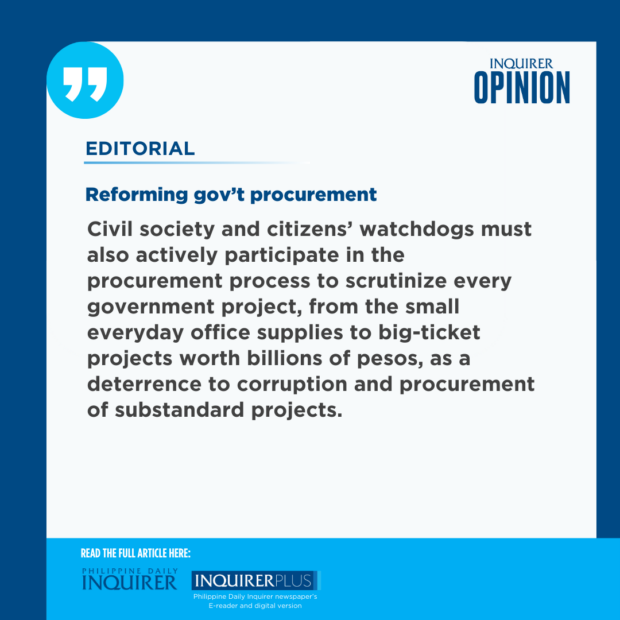
The new Government Procurement Act signed by President Marcos last week promises to be “a game-changing piece of legislation” meant to overhaul the procurement system to make it more transparent, efficient, and responsive to current needs and realities.
This way, Filipinos will get the most for every hard-earned peso that the government will spend on supplies and services that it needs to implement key projects and programs, instead of squandered on either the wrong or more expensive items or, worse, frittered away to enrich corrupt government officials and personnel.
Among its major provisions is the introduction of the “most economically advantageous responsive bid” when considering contract bids, a departure from the old law’s leaning on the “lowest calculated and responsive bid.”
This is in recognition of the incontrovertible fact that cheaper is not necessarily better, thus cost should not be the sole nor primary consideration. The quality of the service or the product should indeed be given its deserved weight when determining the value of bids for government contracts and deciding on the eventual contractor.
Citizen’s participation
Mr. Marcos said this added focus on quality would free the government “from the obligation of selecting the lowest-priced bid when there is a better choice.”
Among 11 new alternative modes of procurement is the creation of an “e-marketplace” similar to online shopping outlets where government agencies can order commonly used office supplies and equipment in as quickly as 30 days from the current six months.
Another key feature of the new law is the streamlining of the procurement process to shorten the awarding of contracts from three months, beginning with the opening bids, to 60 days by standardizing procurement forms and institutionalizing electronic procurement to take advantage of the ease of transactions that technology can bring.
Another welcome provision is the citizen’s participation enshrined in the law, which means that civil society can participate as an observer in the procurement process to ensure transparency.
“We have safeguards every step of the way,” declared Budget Secretary Amenah Pangandaman, who worked on these reforms from the beginning of the Marcos administration in 2022, given the adverse impact of procurement delays on the execution of government projects.
Beneficial owners
These delays, in turn, pull down the country’s economic output as was seen in the second quarter of 2023 when the country’s gross domestic product (GDP) growth was capped at 4.3 percent, decelerating from 7.5 percent in the same period in 2022 and a more-than-expected slowdown from the 6.4 percent in the first quarter.
Pangandaman said then that had the government been able to disburse the funds on time, GDP growth would have been 5.3 percent, underscoring how crucial it is for the government to plan and implement the projects on time.
The law also put in safeguards to protect public funds, particularly the mandate on the disclosure of beneficial ownership or the ultimate owners of suppliers, manufacturers, distributors, contractors, and consultants to ensure that those entities are not owned by the head of the procuring agency.
To prevent conflict of interest, a publicly accessible registry online will be set up so that the public will see the beneficial owners of these companies participating in the bidding of government projects.
Former finance undersecretary Cielo Magno said this provision “will greatly contribute to the reduction of corruption and increased accountability in the procurement process of the government.”
Entrenched corruption
The law’s laudable provisions will go to waste if these will not be implemented to the letter through very clear and transparent rules and guidelines. By not being forced to take the deal with the lowest bid, the government agencies will now have wide discretion to choose which is the most advantageous to the public interest. With the same bureaucratic loopholes and entrenched corruption, how can the law prevent the same shenanigans from manipulating the process to line their pockets with commissions?
Civil society and citizens’ watchdogs must also actively participate in the procurement process to scrutinize every government project, from the small everyday office supplies to big-ticket projects worth billions of pesos, as a deterrence to corruption and procurement of substandard projects.
The unconscionable siphoning off of billions of pesos in COVID-19 pandemic supplies by the undercapitalized Pharmally Pharmaceutical Corp. in cahoots with high officials in the Duterte administration, as well as the education department’s purchase of overpriced but substandard laptops, clearly shows the need to reform the government’s procurement system.
The new law should put an end to this wanton and criminal waste of taxpayer money, but this depends on how serious its implementation will be.